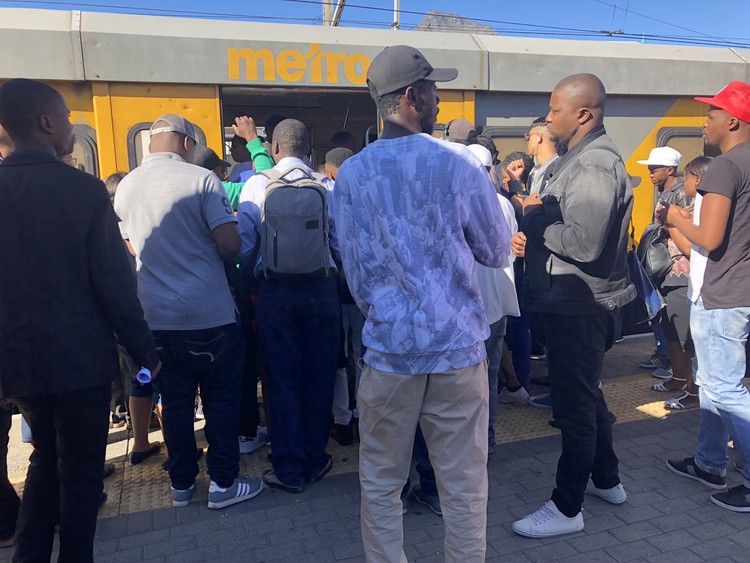Metrorail should have fixed the Central Line trains, say commuters
Service resumes but train doors and windows still broken
As service on Cape Town’s Central railway line resumed on Wednesday after a month, commuters complained that Metrorail had not used the time to fix broken trains.
A limited service on the Central Line was resumed after weeks of suspension due to vandalism, theft of cables and a strike by workers following the killing of a security guard. But several commuters said they had expected Metrorail to fix and service the trains.
Public Transport Voice spokesman Dalton Ndongeni told GroundUp most trains on the Central Line did not have windows. “The doors don’t work properly. After a month of suspended service the trains are back, not serviced, windows and doors not fixed. When windows and doors are not working they put the lives of commuters in danger.”
Last month, 19-year-old Keeno Abib died when he jumped out of a moving train on the Simonstown Line to avoid robbers .
Commuter Kashief Bieding said on Facebook, “And now!!!! You get cancellations due to operational problems. Trains were standing for more than 2 months, why didn’t they get fixed?”
Asked if the Central Line would be fully reinstated, Riana Scott, spokesperson for Metrorail, said the service had not been fully functional since 2015 “due to incessant vandalism, protest action and illegal electrical connections”.
Meanwhile commuters on the Northern and Century Lines continue to struggle to get to work as the service deteriorates daily. On Wednesday, there were no ticket checkers at Parow station. Commuters say this is usually a sign that trains are not running smoothly. Metrorail employees vanish to avoid confrontation from the commuters, they say.
On the train from Parow, GroundUp spoke to a 60-year-old woman who was angry with Metrorail after spending almost an hour on the train she boarded at Parow at 7:38am. The train stopped for more than 20 minutes before Mutual station then stopped again for about ten minutes before Maitland station. A journey to Salt River station that should have taken 20 minutes took about an hour.
“It’s like this every day,” she said. “Trains stop in the middle of nowhere … no communication from Metrorail. I have been on this train since 7:38 and it is now 8:30. Stuck. People are panicking, they are late for work, putting their life in danger by jumping off and walking along the railway line.”
About ten students from Cape Peninsula University of Technology were travelling on the same train to Mowbray campus. At Salt River the 8:47am train was cancelled. The next train came at 9:19am. The students said they missed their 8:30am lecture daily.
A parent travelling on the train said, “Every single day they miss the first lecture. At the end of the semester how many lessons will they have missed?”
He said he had stopped excusing himself for being late at work. “It is meaningless since there is no day I am on time.”
“It’s a matter of time before the whole system collapses and commuters are left stranded with no trains running.”
On Wednesday morning two train drivers, who are members of the United National Transport Union (UNTU), were attacked. Their cabins were stoned by commuters at the Koedoespoort Station in Pretoria, after Metrorail trains were delayed.
UNTU general secretary Steve Harris said PRASA must implement the security measures which had now been implemented on the Central Line in the Western Cape on all the railway lines.
“Unfortunately, PRASA and the South African Police Service (SAPS) have allowed the railway line to become such a war zone that drastic expensive measures are needed nationwide to bring back law and order to our passenger railway system,” said Harris.
Support independent journalism
Donate using Payfast

Next: Foreshore development violates Cape Town’s transport policy, say experts
Previous: SPCA dropped by Lottery
© 2018 GroundUp. 
This article is licensed under a Creative Commons Attribution-NoDerivatives 4.0 International License.
You may republish this article, so long as you credit the authors and GroundUp, and do not change the text. Please include a link back to the original article.

